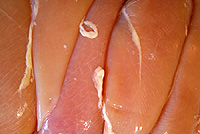Chicken Breast Nutrition Facts

Chicken breasts are rated as a great source of lean, quality protein. Provided that the meat is skinless, a chicken breast has the least amount of fat. When compared to a fat trimmed T-bone steak, chicken breasts have less than half the fat content.
Chicken breasts can be prepared in a variety of ways, but if your aim is to keep your meal as low in fat as possible, it is best to skin the chicken breast before cooking. The skin of a chicken is full of saturated fat, and when cooked with the skin, the fat drips down into the breast meat, changing its nutritional profile.
Many athletes, specifically bodybuilders and fitness competitors, as well as generally health conscious people consume chicken breasts as their number one protein source — not only because of its nutritional quality, but also because chicken breast is extremely versatile, making it a great option to vary healthy meals. It can be baked, boiled, grilled or poached and can be eaten hot or cold.
A typical 1-cup of oven-roasted chicken breast with no skin contains about 231 calories. Of these calories, 5 grams are derived from fat, zero from carbohydrates and 43.4 grams from protein. While the fat content is already relatively low, only 1.4 grams of the 5 grams of fat is considered saturated fat.
Author: Dimi Ingle
Copyright: Remedium. This article may not be copied, in whole or in part, without the written consent of Remedium.
|